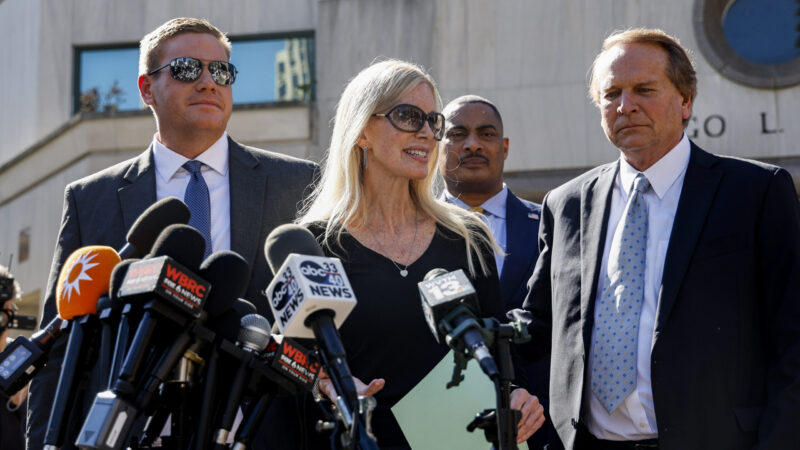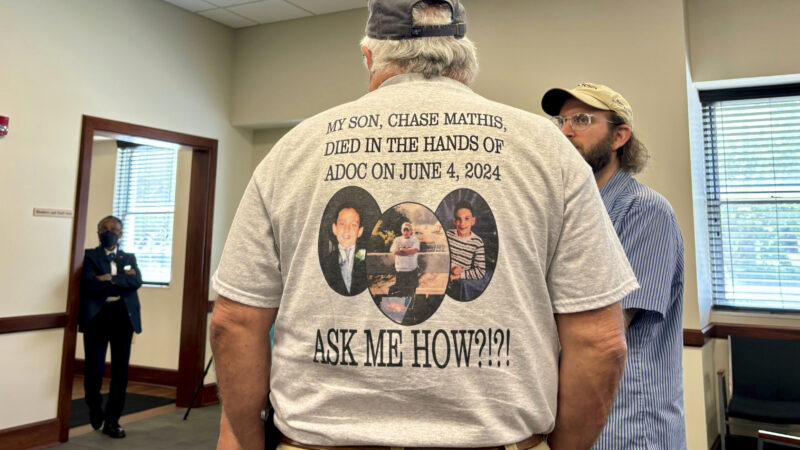Prime suspect admits to Natalee Holloway’s 2005 murder in Aruba
Beth Holloway speaks to media after the appearance of Joran van der Sloot outside the Hugo L. Black Federal Courthouse Wednesday, Oct. 18, 2023, in Birmingham, Ala. Van der Sloot, the chief suspect in Natalee Holloway’s 2005 disappearance in Aruba admitted he killed her and disposed of her remains, and has agreed to plead guilty to charges he tried to extort money from the teen's mother years later, a U.S. judge said Wednesday.
By Kim Chandler and Sudhin Thanawala, Associated Press
BIRMINGHAM, Ala. (AP) — Natalee Holloway was beaten to death on a beach in Aruba and her body pushed out to sea after refusing the advances of the chief suspect in the 2005 killing, who admitted to the murder before pleading guilty Wednesday to extorting money from the missing teen’s mother.
Although Joran van der Sloot isn’t charged in Holloway’s death, his confession may finally resolve a case that has captivated the public’s attention for nearly two decades, spawning extensive news coverage, books, movies and podcasts.
“As far as I’m concerned, it’s over,” Beth Holloway, Natalee’s mother, told reporters outside the federal courthouse in Alabama. “Joran van der Sloot is no longer the suspect and my daughter’s murder. He is a killer.”
Natalee Holloway went missing during a high school graduation trip with classmates. She was last seen on May 30, 2005, leaving a bar with van der Sloot, a Dutch citizen and student at an international school on the Caribbean island where he grew up. He was questioned in the disappearance but never prosecuted. A judge declared Holloway dead, but her body was never found.
Van der Sloot, now 36, pleaded guilty to the extortion and fraud charges in exchange for a 20-year sentence. That prison term will run concurrently with a 28-year sentence he’s serving in Peru for killing Stephany Flores in 2010.
U.S. Judge Anna Manasco said the details of his confession factored into her sentencing decision.
“You have brutally murdered — in separate instances years apart — two young women who refused your sexual advances,” she said.
Shackled and wearing an orange jail uniform, van der Sloot told the crowded courtroom he hoped the confession provides closure.
“I would like the chance to apologize to the Holloway family, my own family,” he said, later adding, “I am no longer the person I was back then.”
The judge said the plea deal required van der Sloot to provide all the information he knew about Natalie Holloway’s disappearance, allow her parents to hear in “real time” his discussion with law enforcement, and take a polygraph test.
After the hearing, Beth Holloway told reporters she was “absolutely confident” that they finally got the truth from van der Sloot after years of lies.
Court documents offer a transcript of his confession.
In an interview conducted by his attorney, he says he and Holloway were lying on the beach kissing. She started to resist, but he kept touching her, so she kneed him between the legs. He stood up and kicked her “extremely hard” in the face while she was still lying down.
At that point, he said, she was “unconscious, possibly even uh, even dead, but definitely unconscious.” He said he picked up a nearby cinderblock and brought it down on her face.
Frightened and unsure what to do, he said he dragged her body until he was knee-deep in the waves, then pushed her out to sea.
The Holloway family has long sought answers about the disappearance, and van der Sloot has given different accounts over the years, at one point saying Holloway was buried in gravel under the foundation of a house but later admitting that was untrue.
Five years after the killing, an FBI sting recorded the extortion attempt in which van der Sloot asked for $250,000 from Beth Holloway to reveal the location of her daughter’s remains. He agreed to accept $25,000 to disclose the location, and asked for the other $225,000 once the remains were recovered.
Van der Sloot chose “greed over Beth Holloway’s grief,” prosecutor Lloyd Peeples told the judge Wednesday.
Van der Sloot moved from Aruba to Peru before he could be arrested in the extortion case. The government of Peru agreed to temporarily extradite him to face trial on the extortion charge, and he will return to Peruvian custody after his case is concluded.
While giving her impact statement Wednesday, Beth Holloway turned to stare directly at her daughter’s killer, sitting just a few feet away in court.
“You look like hell, Joran,” she said.
Alabama prison chief responds to families’ criticism
The department said that a number of changes have been made since Corrections Commissioner John Q. Hamm was appointed in 2022. The department said hiring has increased, and there are ongoing efforts to curb the flow of contraband and improve communications with families.
40 years after ‘Purple Rain,’ Prince’s band remembers how the movie came together
Before social media, the film Purple Rain gave audiences a peak into Prince’s musical life. Band members say the true genesis of the title song was much less combative than the version presented in the film.
Park Fire in California could continue growing exponentially, Cal Fire officer says
Cal Fire has confirmed that over a hundred structures have been damaged in the Park Fire, which grew overnight near Chico, Calif. Difficult firefighting conditions are forecast through Friday night.
Checking in with Black voters in Georgia about the election, now that Biden is out
Some voters who could be key to deciding who wins Georgia. What do they think about Vice President Harris becoming the frontrunner in the race to be the Democratic nominee?
Tahiti’s waves are a matter of ‘life and death’ for surfing Olympics
Tahiti's Teahupo'o wave has a slew of riders for the Paris 2024 Olympics. NPR finds out why it's called one of the most dangerous waves.
Researchers are revising botanical names to address troubling connotations
Since the mid-1700s, researchers have classified life with scientific names. But some of them have problematic histories and connotations. The botanical community is trying to tackle this issue.




